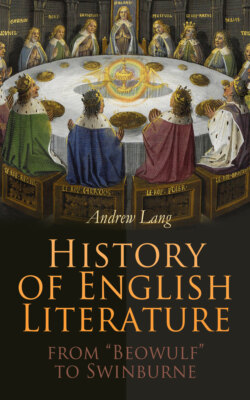Читать книгу History of English Literature from "Beowulf" to Swinburne - Andrew Lang, Robert Kirk - Страница 85
На сайте Литреса книга снята с продажи.
PROFESSIONAL POETRY. Skelton. Barclay.
ОглавлениеMeanwhile professional poetry of society and the Court was sinking to the lowest depth. The verse of the prolific priest and scholar, John Skelton (born 1460? died 1529?), leads nowhere, and though it is full of historical and personal interest, must not detain us. Skelton had honours of a sort, as Laureate, from Oxford, Cambridge, and Louvain. He translated parts of Cicero and other classics, and, in 1500, was highly praised by the famous Erasmus, who later brought the study of the New Testament in Greek to England, and was the wittiest of scholars in the Revival of Learning and of Greek literature. Skelton had Latin enough, of Greek not much, and about 1500 was tutor of the future Henry VIII. His profuse poetry is mainly in long but lively stretches of doggerel; very short rhyming verses, generally satirical, poured from him ceaselessly. He had a "flyting" or scolding match like that of Dunbar and Kennedy, with Sir Christopher Garnesche; he lamented at terrible length the death of "Philip Sparrow," slain by "our Cat Gib"—nothing can be less like Catullus's dirge for Lesbia's sparrow, but some graceful compliments to young ladies are intermixed with the doggerel. He owed the Rectory of Diss, Norfolk, probably to his patron, Wolsey, but for some unknown reason he later pursued Wolsey with libellous satires.
In "The Bowge of Court," when he relapses into stanzas and the outworn allegorical verbiage, he satirizes Court life. In "Colyn Clout," his hero is a tramp, as vehement in attack on all sorts and conditions of men as Piers Plowman. Wolsey was attacked as a despot in "Colyn Clout," and much more bitterly assailed in "Why come ye not to Court": after writing this piece Skelton fled from his foes and creditors to sanctuary in Westminster. He wrote a long "Morality," "Magnificence," with the usual personified vices and virtues. In very bad taste he hurled doggerel at "King Jimmy," James IV, after his glorious death at Flodden, and, more deservedly, attacked the Scots who deserted the Duke of Albany and the French when the Duke wished to lead them across the Tweed.
A brief sample of Skelton when most Skeltonical is his reply to the alleged boast of the Scots that they won the battle of Flodden.
That is as true
As black is blue
And green is grey
Whatever they say
Jemmy is dead
And closed in lead,
That was their own king:
Fie on that winning!
Even in his own country, as he admits, the execrable taste of Skelton was reproved. He had a rude kind of vigour, but his verses make it manifest that a new strain of blood, as it were, was needed in English poetry: old forms, such as the allegorical form, were outworn quite, and verse resembling the poem of Aramis, in lines of one syllable, could not endure, while Skelton's "Crown of Laurel" mixes his own blusterous humour with the stale learning, and pompous allegory of the fifteenth century; and "The Tunning of Eleanor Rummyng" (an ale-wife), in doggerel, is as offensive as the Scottish song, "There was a haggis in Dunbar," and extends to 620 lines. Very truly quoth Skelton:—
I have written too mytche
Of this mad mummynge
Of Elynour Rummynge.
